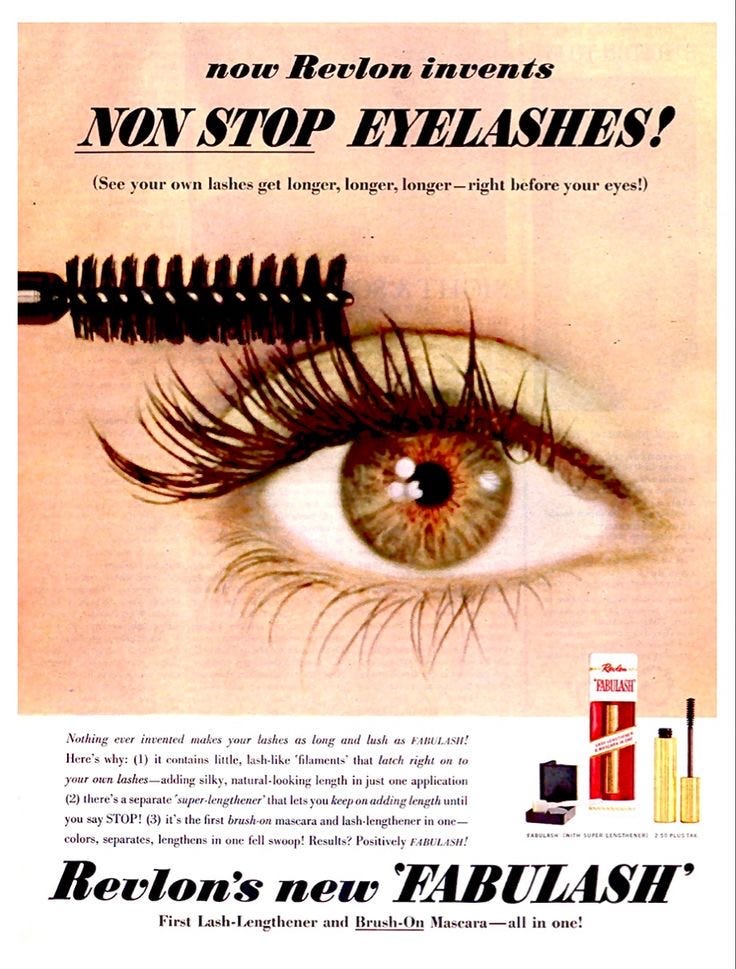“Is mascara out for 2024?” asked Glamour in a recent article. Florence Pugh, Kate Middleton, Hailey Bieber, and Kylie Jenner are among the growing number of celebrities ditching mascara in favour of a natural, fresh-faced look. Could it be the latest iteration of the no-makeup makeup look? If 2023 was the year of blush, 2024 is certainly shaping up to be the year of no mascara.
For many, this shift could be a huge relief. No more hassle of removing mascara at night, no more flaking or smudging just as you've finished your look. My own relationship with mascara began at 11, marking the start of a complex journey. My mum wasn't a fan of makeup, so we never had any in the house. When I did discover mascara, I went all in, as you can imagine. I very quickly learnt that there is an art to removing mascara, which, of course, I didn’t know. I desperately tried to get it off before my mum saw, pulling out half my lashes in the process. Whether they failed to grow back or I was born with short lashes, it makes for the foundation of my mascara origin story.
From that moment, I decided that mascara would be a crucial part of my routine. How could I possibly survive without longer, fuller lashes? This dependence led to an expensive quest for the perfect lash-enhancing products. Today, my routine includes three to four mascaras at any given time, not counting the mascara primer I recently discovered – which I think does something.
Eyelashes serve essential functions, like protecting our eyes from debris and diffusing airflow to keep them moist. Yet, they have also become powerful symbols of beauty and attractiveness. Why have these practical features turned into a sought-after beauty accessory? While there are many theories for why this is the case, scientists are still debating.
One popular theory is that long, lush lashes signal good health. A study in the Journal of Cosmetic Dermatology suggests that healthy, well-maintained lashes might indicate a robust immune system and good nutrition, indirectly marking someone as a good potential mate.
Evolutionary biologists propose that long lashes contribute to a "neotenous" or youthful appearance. This is also known as the "baby schema" effect, which suggests that features reminiscent of infants - like large eyes and long lashes - trigger nurturing responses. A study by the University of Cambridge found that faces with elongated lashes were consistently rated as more approachable and kind, likely due to their resemblance to a wide-eyed, innocent look.
Let’s not downplay the role of cultural and media influences. Icons like Audrey Hepburn and Twiggy popularised the look of long, fluttery lashes, cementing their status as a beauty ideal. Media perpetuates these standards through endless images of celebrities and models with dramatic lashes, making them synonymous with glamour and allure.
Advancements in cosmetic science have further fueled this phenomenon. Innovations like lash extensions, serums, and high-tech mascaras make it easier than ever to achieve the coveted long-lash look, in turn perpetuating the desire for them. According to a report by Allure, the eyelash extension industry alone has grown by over 15% annually, reflecting massive demand.
The global market for mascara is projected to reach USD 7,609.09 million by 2028, with a CAGR of 3.67%. I will probably account for a fair share of that growth. At one point, my mascara routine was crucial for a successful makeup day. I spent what felt like hours perfecting my lashes: lengthening, adding volume, and combing them to separate each lash. My key to success: work on one eye at a time, starting with the wettest formula and using a dry mascara to comb the lashes to finish.
I lugged my mascaras around, performing my routine with the precision of a surgeon. I convinced myself that, because I wore glasses, mascara was essential to prevent my eyes from being drowned out. I present to you a real-life case of beauty manipulation and the fall into a self-imposed makeup dependency. I’m consistently impressed by my cousin’s no-mascara approach. She can’t deal with the faff and so forgoes the whole thing. Why couldn’t I have been dealt that gene?
I thought the no-mascara trend might end my relationship with mascara. But it’s mid-July, and I haven't lasted more than three days without preening my lashes. Despite my best efforts, I’ve accepted my fate: I’m a mascara person, maybe for life.






Thanks for this. I can't bear to see my face without mascara! I justify it because it highlights my eyes, which might be my best feature. Without mascara my face looks naked and vulnerable.
I’ve been using the same mascara for about 14 years (maybelline lash stiletto in black, non-waterproof). You can’t even get it where I live so when I’m in the US I stock up and use it well beyond the advised 3 months. I will not be going the way of no mascara any time soon!